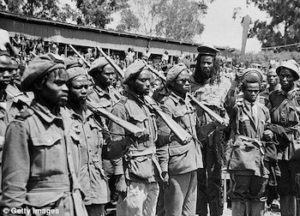
*On this date in 1952, we remember the Mau Mau Uprising. Also known as the Mau Mau Rebellion, the Kenya Emergency, and the Mau Mau Revolt, was a war in the British Kenya Colony (1920–1963) between the Kenya Land and Freedom Army (KLFA), also known as Mau Mau, and the British.
The Mau Mau were the confrontational wing of a growing demand for political representation and freedom in Kenya. This episode was one of many acts of Black liberation in the continent following the European invasion after the Berlin Conference.
The first attempt to form a countrywide political party began on October 1, 1944. This fledgling organization was called the Kenya African Study Union. Harry Thuku was the first chairman, but he soon resigned. There is a dispute over Thuku's reason for leaving KASU: Bethwell Ogot says Thuku "found the responsibility too heavy"; David Anderson states that "he walked out in disgust" as the militant section of KASU took the initiative. KASU changed its name to the Kenya African Union (KAU) in 1946.
Author Wangari Maathai wrote that many organizers were ex-soldiers who fought for the British in Ceylon, Somalia, and Burma during the Second World War. When they returned to Kenya, they were never paid and did not receive recognition for their service. In contrast, their British counterparts were awarded medals and received land, sometimes from the Kenyan veterans.
Dominated by the Kikuyu, Meru, and Embu people, the KLFA also comprised units of Kamba and Maasai peoples who fought against the white European colonist-settlers in Kenya, the British Army, and the local Kenya Regiment (British colonists, local auxiliary militia, and pro-British Kikuyu people). The capture of rebel leader Field Marshal Dedan Kimathi on October 21, 1956, signaled the defeat of the Mau Mau.
However, the rebellion survived until Kenya's independence from Britain, driven mainly by the Meru units led by Field Marshal Musa Mwariama and General Baimungi. Baimuingi, one of the last Mau Mau generals, was killed shortly after Kenya attained self-rule. The KLFA failed to capture widespread public support.
General Sir Frank Kitson, who served in the British colonial forces in Kenya, authored a book entitled Gangs and Counter-gangs. He described manipulating the Mau Maus into rival gangs and pitting them against one another. Despite attempts to unify the factions, the Mau Mau movement remained divided. Meanwhile, the British applied the strategy and tactics they developed to suppress the Malayan Emergency.
The Mau Mau Uprising created a rift between the European colonial community in Kenya and the metropole, resulting in violent divisions within the Kikuyu community. Suppressing the Mau Mau Uprising in the Kenyan colony cost Britain 55 million and caused at least 11,000 deaths among the Mau Mau and other forces, with some estimates considerably higher. This included 1,090 executions at the end of the war in 1960, the largest wartime use of capital punishment by the British Empire. This episode set a precedent for the eventual independence of Kenya from Britain.